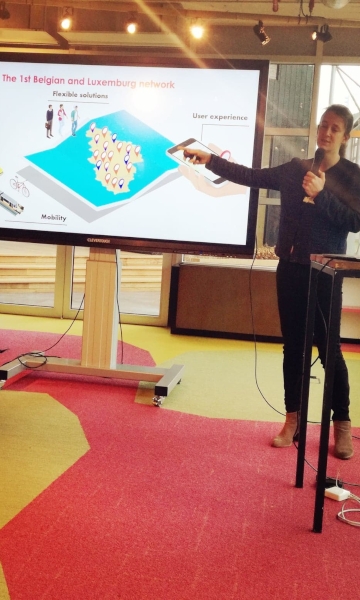Smart Cities Chair #11: Work and Life in the Smart City
The eleventh edition of Smart Cities Chair took place last Thursday on the subject of “living in a smart city”. Host Peter Ballon had invited four exciting speakers to share their expertise with the audience. The result was a stimulating afternoon further to which the members of the audience took home much food for thought. For those who were not there, here is a brief summary.
The first speaker was
Emilie Delacroix, Head of CSR and Innovation at
Befimmo, which, with Silversquare, jointly manages a magnificent coworking space,
Silversquare Triomphe.
In her presentation, Delacroix described the points to which Befimmo pays particular attention when designing smart office spaces. The customer experience is of the essence:
it must be possible to adapt the workplace to the customer’s requirements, and its size and layout must be flexible. Although the traditional offices and meeting rooms remain, they are complemented by a cheerful café area with comfortable chairs, long tables and booths where people can take refuge when they really need to concentrate. Coworking also enables people to network with other companies or startups.
Ultimately, said Delacroix, time and money are no longer the only factors in office design. These days, offices need to take matters a step further and become services.
Speaker number two was
Michaël Rykewaert of
Affordable Housing, who spoke on the subject of
sustainable, socially conscious and affordable city housing, and mentioned a number of alternatives with potential, for instance:
- housing as a service, in the form of affordable flats into which people can move immediately. This means that some facilities would be shared, such as the garden;
- flat- or house-sharing, in which people’s private space would be limited to a bedroom with or without bathing facilities;
- housing cooperatives, in which each resident would be a shareholder and hence a joint co-owner, and would have their say in the management of the cooperative.
Not only would these various forms of housing be more affordable; they could also function as a means of preventing loneliness, for instance in the case of the elderly. Modular housing could also be adapted to meet the needs of the inhabitants at various stages of their lives.
After a short coffee break,
Marc Numann of
Newman in Town took the stage. During his presentation, he mentioned the increasing diversification of multinational companies such as Google, Uber and Amazon, which operate in every area of life to determine the requirements of customers and supply appropriate solutions.
What if these companies decided to operate in the real-estate sector? What if they built their own housing using their own technology? How about a Google house? Would it be more expensive than an ordinary house, or an Uber house?
It may sound weird, but ten years ago who would have thought Amazon would be opening supermarkets?
In short,
the influence of these corporate giants, their potential for innovation and their branding are bound to affect the real-estate sector. A situation worth watching, certainly!
Last but not least, the final speaker was David Donckers, CEO of Dago, Belgium’s premier installer of structured data cabling and managed IT.
Donckers focused on
the integration of the IoT in buildings, for instance
sensors which could adjust lighting and other parameters according to circumstances. When there is only one person in a room, the air does not need to be renewed as often and the thermostat can also be set a little higher than for a large group. A smart building could detect the number of people in a room and automatically adjust temperature and air circulation.
Whether or not we like it, it’s going to happen: tech is on the point of revolutionising Belgian housing. In future, people rather than buildings will be central to real estate. And like all smart-city projects and apps, this change has a single and important purpose: a better quality of life for all.
Discover the speakers' presentations
here.
